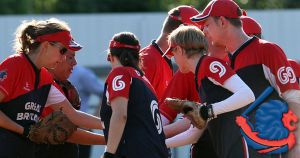 Those of you who saw the first issue of the GB Softball Newsletter at the end of May will know that, thanks to an unusual combination of circumstances, all seven GB fastpitch and slowpitch national teams are playing in official ESF or ISF competitions this year – the first time this has ever happened. A rough guesstimate has put the total travel costs for these seven teams at something over £100,000.
Those of you who saw the first issue of the GB Softball Newsletter at the end of May will know that, thanks to an unusual combination of circumstances, all seven GB fastpitch and slowpitch national teams are playing in official ESF or ISF competitions this year – the first time this has ever happened. A rough guesstimate has put the total travel costs for these seven teams at something over £100,000.
That's a scary number, and it gets scarier when you look at what some individual players or their families are having to pay.
Cutting corners
Back in March, the GB Men's Fastpitch Team cut every corner it could in terms of food, accommodation and transport when they went to the World Championships in New Zealand and finished a very creditable ninth. But the players still had to pay £400 each – plus the cost of their flights to New Zealand.
The GB Under-19 Women are about to play in Junior World Championships in Canada, and each player is having to pay £750 – plus the cost of flights to Toronto.
You would think it would be cheaper to play in Europe as opposed to New Zealand or Canada, and generally it is. But when the GB Women's Team plays in the European Championships and World Championship Qualifier in Prague in July, players will be paying up to £1200 – in part because the Women's Team chooses to pool the cost of flights for players coming to Europe from around the globe.
This comes after some GB Women players are still paying off the £1500 it cost last year to go to the ISF World Championships in Whitehorse, Canada and to warm up for the tournament at the Canadian Fastpitch Open near Vancouver.
Even the GB Under-13s, who will travel to a suburb of Parma, Italy in August for the ESF's Massimo Romeo Youth Cup, will need to find £650 per player whereas last year, to travel to the same location for the same tournament, players paid £550.
The bottom line
In other words, costs keep going up, and in a time of widespread and continuing “austerity” in Europe and North America, where the value of wages keeps going down in relation to the cost of living, GB Softball, like many other sports that don't receive government funding, is struggling.
The only sports that do receive significant funding these days for elite athletes or national teams are those that the British government and its sporting agencies believe can win Olympic medals. Until and unless softball (along with baseball) gets back on the Olympic programme – and that won't be until 2020 at the earliest – there is no hope of funding help from the government.
GB Softball has been punching above its weight in international competition for many years. The GB Slowpitch Team has won eight straight European Championships. The GB Men’s Fastpitch Team is ranked #9 in the world and the GB Women’s Fastpitch Team is ranked #11. The GB Under-19 Women’s Team is now playing at World Championship level and our Under-19 Men and our Under-16 and Under-13 Girls’ Fastpitch Teams are moving up the European rankings.
But this year, much more than in the past, GB Softball is beginning to see the inevitable result of the generally grim financial picture: players refusing selection because they can't afford to play for their country.
Nothing will undermine a national team programme and player morale more than that.
Who can help?
So where can GB Softball programmes – many of whom have been amazingly successful on the international stage – turn to relieve the pressures on families and players?
Some people have asked why BaseballSoftballUK can't offer more help, or the British Softball Federation.
In the case of BaseballSoftballUK (BSUK), the answer is simple: they're not allowed to provide financial help to national teams. Almost all of BSUK's money – and it's quite substantial – comes from the government agency Sport England, but that money is tightly ring-fenced for grass roots development initiatives and programmes agreed between Sport England and BSUK. Now and for the past few years, BSUK has funded the Softball Academy by telling Sport England it was a development programme, and in the 2013-17 funding cycle, BSUK has been given a small amount of money (£12,500 per year for softball) to enhance what Sport England calls the “talent pathway”, which largely means the provision of coaching support for players who might eventually play for national teams.
But if BSUK was to give any funding directly to national teams, especially to defray travel costs to competitions, Sport England would claw it back and might cut funding to softball and baseball altogether. It just can't be done.
In the case of the British Softball Federation, the answer is even more straightforward: the BSF actually spends a high proportion of its total income supporting national teams.
The BSF pays entry fees for national teams to ESF or ISF competitions, it pays half the cost of getting the same number of British umpires to tournaments as we have national teams playing, it pays venue hire costs for national team training at the Dome in Milton Keynes and elsewhere, it provides bursaries for national team players who are struggling financially and it pays a substantial amount, in partnership with BSUK, to support a GB Programme Director to oversee all our national team programmes.
The BSF simply couldn't afford to pay any more towards national team costs than it does. But the other point is that the cost of national team travel in 2013 will be more than twice as much as the BSF's total income from membership fees.
The cost of supporting a full range of successful national team programmes, and ideally helping them to grow and progress, is simply on a different scale.
Fundraising, sponsorship and grants
The other question that is often heard is: “Why can't teams and players fundraise? Why can't they find sponsors or grants?”
The quick answer is: they do. Most GB teams carry out some kind of fundraising among family, friends and the local community, and some money is often raised, even though the amounts are generally small in relation to what's required. Sometimes, small local sponsorships are found.
But major sponsorship from the kinds of companies that spring too easily to people's lips – McDonalds, Virgin, Coca-Cola et al – are never going to happen because softball in the UK has no public profile or media exposure and so the sponsor gets no return on their investment.
British softball and baseball have occasionally had corporate sponsorship in the past, and on one or two occasions it has been reasonably substantial. But in every single case, without exception, the sponsorship has come about because of a personal connection, without any real benefit to the company giving the money. It was done as a favour to a relative or a friend. And in the current economic climate, which won't be changing any time soon, these kinds of opportunities have all but dried up.
As for grants, British softball and baseball have occasionally had these in the past. But they have been more gifts than grants, from individuals who have had a personal reason for wanting to support GB softball or baseball. These kinds of gifts come out of the blue, they are very occasional, and they can't be planned for or relied on.
Grant-funding agencies or charities – the kind you can find in the many self-help books on how to raise money for your cause or organisation – are simply not interested in giving money to national sports teams. Inevitably, and often by charity law, such grants are restricted to causes that are frankly more important and more deserving: medical research, poverty relief, homelessness, aid to developing countries, disability and so on.
Closer to home
The financial plight of softball national teams is not unique. It is shared by British baseball, and by many other minority sports in the UK and elsewhere.
But because softball is so new in this country, it tends to lack – or is only beginning to acquire – a fundraising dimension that some other sports enjoy: its own “alumni”, as Americans might term them.
An amazing number of women and men who have played GB softball over the past 15 years, whether they have been GB-based or overseas-based, rate the experience as one of the highlights of their lives. There is something about playing softball for GB and sometimes triumphing against all the odds, that isn't soon forgotten, and lifelong friendships that have been made. These players have gotten a huge amount out of our programmes for a period of time.
Hopefully, some of these former players, and possibly their families, will be willing to help others have the same experience.
But GB national teams and players could also use more support from the current softball community that they represent overseas and in which many of them play. There is an easy way to help: through the DONATE button on the front of this Newsletter or on the Home Page of the BSF website.
GB Softball will continue to pursue every fundraising avenue it can. There is now a professional fundraiser on the GB Management Committee and a lot of ideas are being developed and will come to fruition over the next two or three years. Sponsorship opportunities, if there is some connection to the sport, will be explored. No one is complacent or defeatist.
In the next issue of this Newsletter, we'll be telling you about a crowdfunding campaign that will shortly get underway, and how you can promote the chance to fund GB teams and individual GB players, through your own networks of family, friends and colleagues.
Meanwhile, however, any help that recipients of this Newsletter can provide – and anyone else who would like to help – will be very much appreciated in a time of need.
The GB Management Committee
